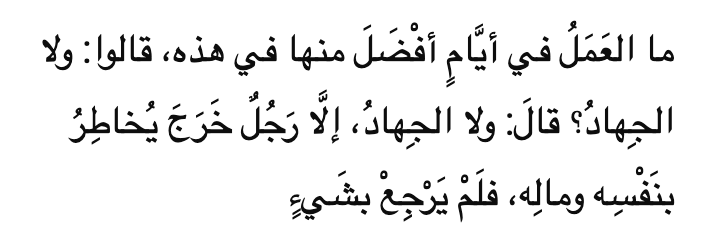The first ten days of Zulhijjah hold a unique and significant place in the Islamic calendar, signifying a period of profound spiritual opportunities and blessings. Muslims around the world cherish these days, as they were particularly emphasized by Prophet Muhammad (peace be upon him) for their unparalleled virtue and importance.
The Prophet Muhammad (peace be upon him) highlighted the exceptional nature of these days with the following Hadith:

“No good deeds done on other days are superior to those done on these (first ten days of Zulhijjah).” Then, some companions of the Prophet said, “Not even Jihad?” He replied, “Not even Jihad, except that of a man who risks himself and his property (for Allah’s sake) and does not bring anything back.” (Hadith Narrated by Imam Al-Bukhari).
This Hadith underscores the immense spiritual value and rewards associated with good deeds performed during this period. The significance of the first ten days of Zulhijjah can be understood through various aspects:
Muslims are encouraged to increase their acts of worship during these ten days. This includes additional prayers, recitation of the Quran, and making Dhikr (remembrance of Allah). Fasting on the first nine days, especially on the Day of Arafah, is highly recommended. The Day of Arafah, the 9th of Zulhijjah, is considered the most important day of Hajj and fasting on this day is believed to expiate the sins of the previous year and the coming year.
These ten days coincide with the annual pilgrimage of Hajj, which is one of the Five Pillars of Islam. Hajj takes place from the 8th to the 12th of Zulhijjah, culminating in the Day of Arafah on the 9th. For those performing Hajj, these days are a time of intense spiritual reflection and fulfillment of religious duties.
Eid al-Adha, also known as the Festival of Sacrifice, falls on the 10th of Zulhijjah. This day commemorates the willingness of Prophet Ibrahim (Abraham) to sacrifice his son Ismail (Ishmael) in obedience to Allah’s command. Muslims around the world celebrate this day with special prayers, feasts, and the ritual of Qurbani, the sacrifice of an animal, which symbolizes obedience and submission to Allah.
The first ten days of Zulhijjah are also a time for increased charity and performing good deeds. Muslims are encouraged to help those in need, strengthen family ties, and engage in acts of kindness. The spirit of giving and compassion during these days amplifies the rewards and brings the community closer.
The first ten days of Zulhijjah are a precious opportunity for Muslims to seek spiritual growth, forgiveness, and closeness to Allah. By engaging in worship, charity, and good deeds, believers can make the most of this blessed time.
The profound emphasis placed on these days by the Prophet Muhammad (peace be upon him) serves as a reminder of their significance and the immense rewards that lie within them. As Muslims around the world observe these days, they are reminded of the mercy and blessings of Allah, and the importance of striving for righteousness and piety.